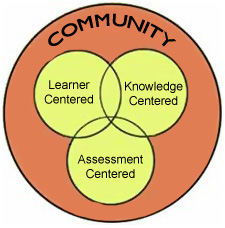How People Learn: Presenting the Learning Theory and Inquiry Cycle on Which the IRIS Modules Are Built (Archived)
Assessment
Take some time now to answer the following questions. Please note that the IRIS Center does not collect your Assessment responses. If this is a course assignment, you should turn them in to your professor using whatever method he or she requires. If you have trouble answering any of the questions, go back and review the Perspectives & Resources pages in this module.

- Discuss the elements that learner-centered instruction should contain.
- Design a learner-centered activity for a course you are currently teaching.
- Discuss the elements that knowledge-centered instruction should contain.
- Design a knowledge-centered activity for a course you are currently teaching.
- What are the two types of assessment that should be included in assessment-centered instruction, and how are they different?
- Pick an assessment that you have used in a past course. Redesign it using the assessment-centered elements that you learned about in this module.
- Why is community centeredness important to student learning?
- What types of community-centered activities have you used in the past? What made them community-centered?
- When, how, and by what means can you evaluate your own instruction? In addition, can you determine whether your students have become self-evaluative? Once you have assessed their skills in this way, how can you use that information to further enhance their learning? Explain your answer.